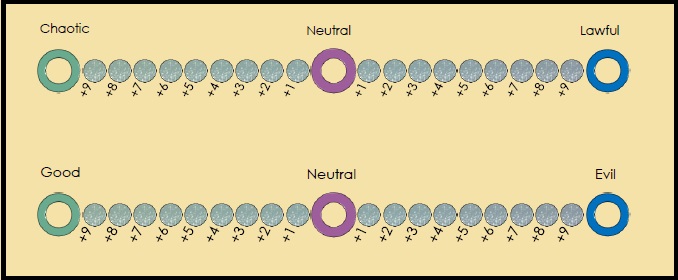Managing your characters psychic beacon
There are two critical factors that influence your characters psychic emanations and determine whether they are a strong beacon for the gods.
Character Alignment:
The first is your character's alignment. However, in this world character alignment works in a slightly different way to the approach followed by most RPG's, including the way it is described in the WFRP Core Rulebook. Rather than dictating the way a character should behave and telling you how you should play your character. Alignment in Fragile Alliances is a reflection of how your character has behaved and how you the player have chosen to play them. So, it’s more like a record, or rap sheet, that monitors the nature of your character rather than a dictate that imposes a roleplaying stereotype. This is achieved by the use of two sliding scales each divided into twenty increments. During play your characters performance and behaviour will be periodically reviewed by the GM and the other players and based upon your characters actual activity since the last review it will be awarded both Experience Points (EP) to reflect its achievements and Alignment Points (AP) to reflect how your character's behaviour has been judged. Alignment Points are expressed as direction and value. E.g. +2 Chaotic will move your character's alignment two increments towards Chaotic and away from Lawful. Thus a character who was Lawful (+3)/Good(+4) would become Lawful(+1)/Good(+4).Generally speaking, characters whose behaviour falls between 0 and +5 on both scales in either direction are unlikely to attract the attention of a warp entity. However, if either scale begins to move towards +10 in any extreme the probability of divine intervention will increase appropriately.ALIGNMENTBEHAVIOURCHAOTICChaotic behaviour usually involves activities which are either unlawful or disrespectful of authority and accepted social behaviour. Ignoring a legitimate order would be considered chaotic, as would going against local customs or tradition.LAWFULLawful behaviour is basically compliance and conformance to social order, the law, tradition and local customs. Subservience to authority and enforcement of the law would both be considered lawful acts.GOODGood behaviour involves actions that are intended to do what the character considers to be right, even though it might not be in their best interests. They are actions based upon the characters conscience instead of their self-interest. However, in order to qualify as a truly good action, the character needs to be aware of both the motive and risks involved. An accidental good deed would not necessarily count.EVILEvil behaviour involves actions which are purely motivated by the self-interest of the character, even though they know that their action is not right and may put others at risk. Note: An action cannot be judged evil if the character was not aware that it was wrong at the time it was committed, therefore motivation is an important factor. The character must be aware that his actions are not the right thing to do.
Character Reputation:
The second factor is your character's reputation. Whereas alignment is a reflection of your character's behaviour, reputation is a reflection of what other characters in the game feel about that behaviour. As such your characters reputation can and will vary both over time, and also according to the characters being asked. In effect, your character can be loved by one character and hated by another, and so it is more subjective and varied in content than alignment. However, as with alignment your character's reputation will be reviewed and updated periodically. The other players will be asked to summarise their characters opinion of yours, and the GM will add any specific reputation notes on behalf of the NPC’s your character has had interactions with during gameplay. Reputation will also take into account your characters adherence to religious strictures and piety, which may be of particular importance in deciding whether your character is worthy of divine assistance. However, for the most part, reputation will determine how other characters react to yours in the future and whether they decide to invoke the blessings or wrath of their gods on you. The GM will refer to your character's reputation with those he comes into contact with during play to decide whether divine intervention or manifestation is appropriate. In practice, reputation affects far more than just the likelihood of being subject to divine intervention. It will also affect all of your characters future dealings with the NPC's concerned and their likelihood of co-operating or hindering your goals. It may also affect how much you are charged for things you purchase from a character and how much trust you can place on their information and actions. Reputation is based upon a scale From +10 to -10 as follows: Impact of Reputation Reputation has a direct impact on your character's relationship with another entity in the game.- It affects how helpful or co-operative other characters are towards your character by modifying the results of Social Interaction Tests.
- It can affect how other characters react to your character even to the point of them trying to kill your character.
- It can affect your characters ability to perform certain actions. e.g. If your characters god hates them they are unlikely to respond to a plea for help.
- It can determine whether your character can succeed in a Personal Objective. e.g. A Slayer must foster a good reputation with Grimnir before they die.





Comments